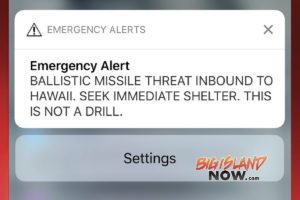Legislation to Improve the Emergency Alert System
 Following the false emergency alert that went out across Hawai‘i on Saturday, Jan. 13, 2018, and caused widespread panic, U.S. Sens Brian Schatz, Kamala Harris (D-Calif.), and Cory Gardner (R-Colo.) introduced the Authenticating Local Emergencies and Real Threats (ALERT) Act, legislation that would improve the emergency alert system and give the federal government the sole responsibility of alerting the public of a missile threat, prohibiting state and local governments from doing so.
Following the false emergency alert that went out across Hawai‘i on Saturday, Jan. 13, 2018, and caused widespread panic, U.S. Sens Brian Schatz, Kamala Harris (D-Calif.), and Cory Gardner (R-Colo.) introduced the Authenticating Local Emergencies and Real Threats (ALERT) Act, legislation that would improve the emergency alert system and give the federal government the sole responsibility of alerting the public of a missile threat, prohibiting state and local governments from doing so.
“States are laboratories of democracy. They should not be the laboratories of missile alerts,” said the ranking member on the Commerce Subcommittee on Communications, Technology, Innovation, and the Internet Senator Schatz. “The people who know first should be the people who tell the rest of us. This legislation makes clear that the authority to send missile alerts rests with the federal government.”
“This is a common-sense step to ensure that accurate national security information is used to assess whether or not an emergency alert about a missile threat should be deployed,” said Senator Harris. “It will also ensure that state and local governments continue to play a critical role in emergency response efforts, and provide the federal government with the ability to make missile alerts a more effective public safety tool.”
“Our national integrated public alert system is not something we can afford to get wrong,” said Senator Gardner. “What happened in Hawai‘i can never happen again – people terrified by the false alert of a system that must have absolute confidence. We need to make sure we have safe and reliable protocols in place that quickly alert Americans about serious threats, whether those threats be fast-moving wildfires or actual ballistic missile launches from rogue states like North Korea. Since they have full control over drafting and issuing alerts, state and local governments need to meet certain standards to participate in our national alert system and the Federal government must be heavily involved in any alerts regarding national security crises. We need to continue to do everything in our power to prevent the worst from happening and that includes being prepared for the worst.”
State and local governments have been largely responsible for alerting the public of threats from natural disasters and severe weather. But the system they use rests upon a patchwork of technologies and procedures that do not follow consistently across the government agencies that issue these alerts. The false alarm in Hawai‘i highlighted some of the weaknesses in the state’s emergency alert system, which had a poorly designed user interface and did not have sufficient verification system or computer redundancies to act as a safeguard from mistakes. The incident made clear that there is a need for federal standards in the system and called into question the state’s responsibility to issue a missile alert.
The Schatz-Harris-Gardner legislation would strengthen the way states and local governments use the Integrated Public Alert and Warning System (IPAWS), the FEMA platform emergency management professionals across the country use to issue warnings.
The ALERT Act would:
- Restrict the authority to alert the public of a missile threat to the Federal government. It would also require FEMA to establish a process to promptly notify state authorities when a missile alert is issued so they can activate their own protective action plans to ensure public safety;
- Require the IPAWS subcommittee of the FEMA National Advisory Council to make recommendations on the best practices that state and local governments should follow to maintain the integrity of IPAWS. At a minimum, the subcommittee would make recommendations regarding the incident management tools used to originate alerts, and the procedures for testing and sending notifications to the public to avoid false alarms;
- Require FEMA to establish minimum requirements for state and local governments to participate in IPAWS within 120 days of receiving the subcommittee’s recommendations. States would have reasonable time to implement any new requirements FEMA imposes;
- Require FEMA to establish a process to test the incident management and warning tool that a state or local government adopts to originate and send alerts to the public in the FEMA IPAWS Lab and to certify it meets any technical requirements that FEMA adopts;
- Require FEMA to review its Emergency Operations, National Watch and Regional Watch Centers to assess their ability to track state and local alerts issued under IPAWS and determine which ones they should be notified about when states send them out.
In addition to Senators Schatz, Harris, and Gardner the ALERT Act is cosponsored by U.S. Senators Dan Sullivan (R-Alaska) and Mazie K. Hirono (D-Hawai‘i).
Sponsored Content
Comments





_1770333123096.webp)


